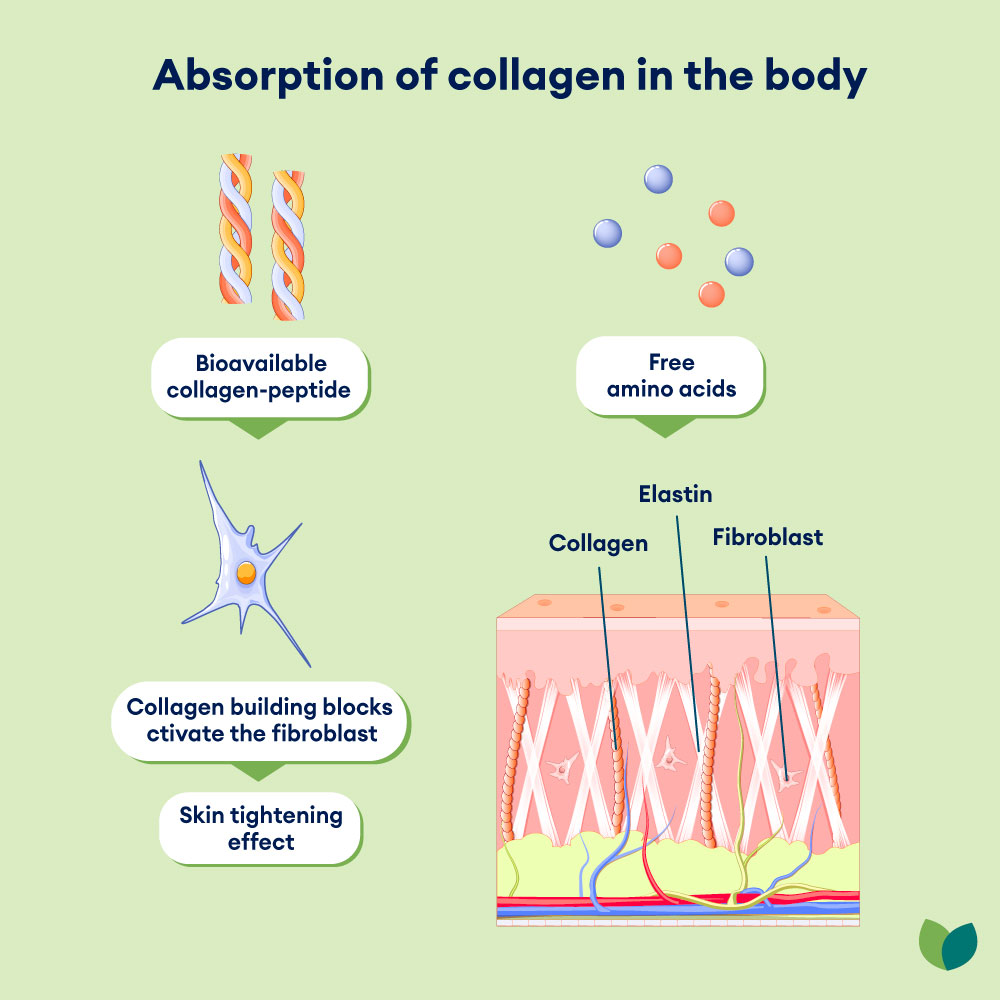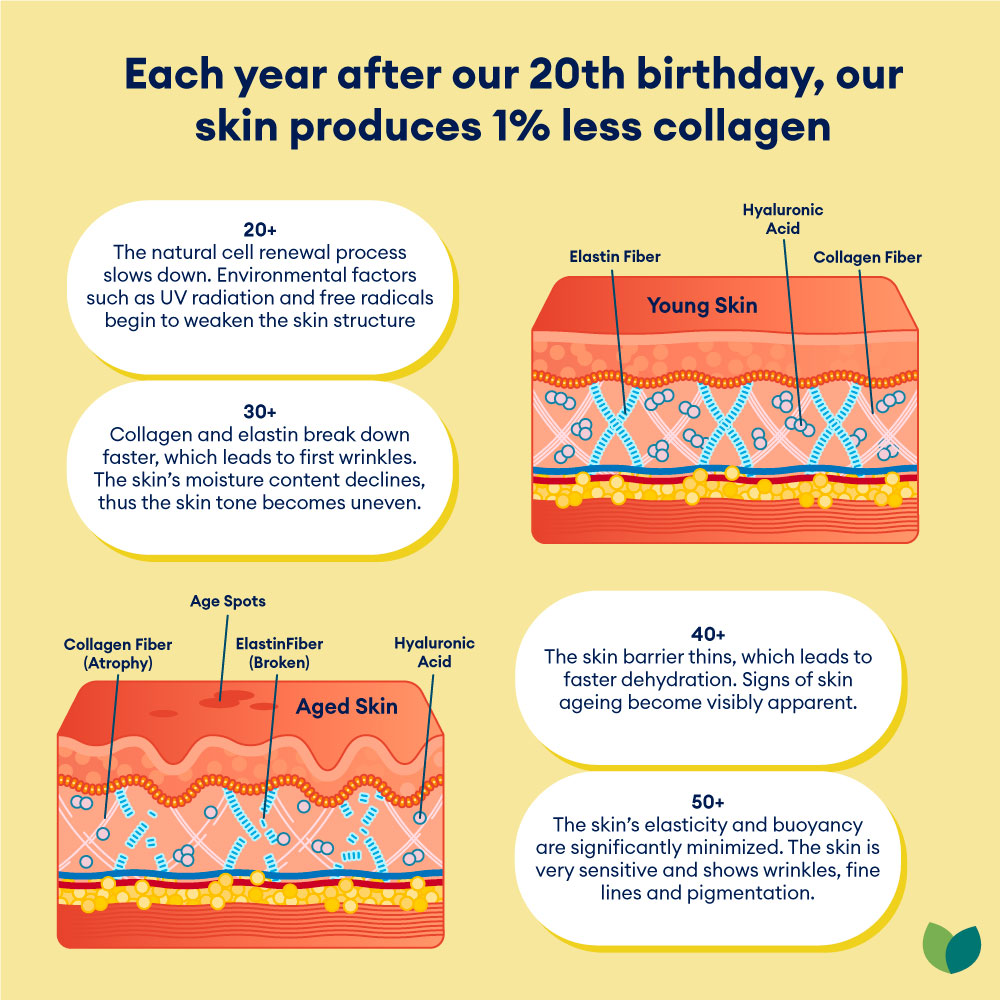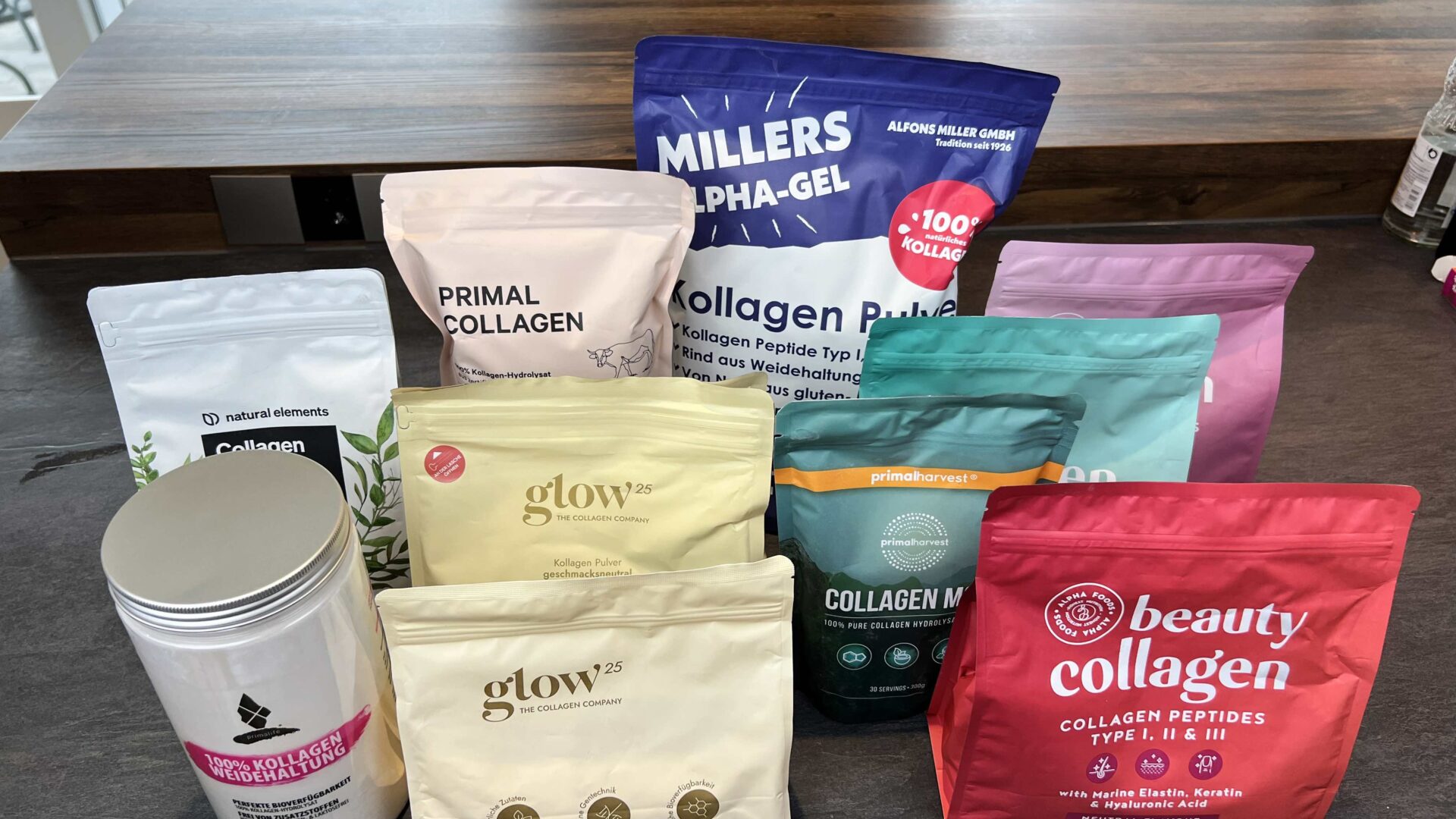Many spend vast amounts of money on skincare products, anti-ageing treatments and cosmetic surgery to combat the signs of ageing. But what if the answer to healthy skin, shiny hair and strong nails lies not in expensive creams or surgical procedures, but in a protein that already exists in our own bodies? Welcome to the fascinating world of collagen: In this science-based blog article, we will take a closer look at the effects, uses and amazing anti-ageing properties of collagen powder: How does collagen work in the body, and are there any potential side effects? Should you take collagen powder in the morning or in the evening, and how do you recognise a collagen deficiency?
What is collagen?
Collagen is a fibre-like protein, which is found in large quantities in our body and forms the basic framework for various tissues. There are 28 different types of collagen, with type I, type II and type III being the three most important – they make up around 90 per cent of the collagen in our body.
Type I collagen is the most abundant collagen in the human body and plays a crucial role in the skin, bones, tendons and blood vessels. It gives the skin its firmness and elasticity, ensures strong bones and is a main component of connective tissue.
Type II collagen is mainly found in cartilage tissue and plays a key role in maintaining joint health. It provides flexibility and shock absorption in the joints, which is particularly important in preventing joint problems such as arthritis.
Type III collagen is found in the skin, blood vessels and internal organs such as the liver and lungs. It supports the flexibility and structure of these organs and is also involved in wound healing.
The distinction between these different types of collagen is important as they have different functions in the body and are prevalent in different tissues. With age, the production of collagen decreases, which indirectly leads to a collagen deficiency – more on this below. The choice of a collagen supplement should therefore depend on individual needs, depending on which tissue or organ is to be specifically supported.
Der große Kollagenpulver-Test: 7 Marken im Vergleich
Wir haben verschiedenste Kollagenpulver-Marken auf ihre Wirksamkeit und ihren Mehrwert für Haut, Haare, Gelenke und Bindegewebe getestet. Welche halten, was sie versprechen? Wir gehen auf die maßgeblichen Faktoren wie Löslichkeit, Inhaltsstoffe und Preis-Leistungs-Verhältnis ein.
The effect of collagen powder
Collagen powder is obtained from animal sources such as bovine bone, fish skin or chicken skin. It contains hydrolysed collagen, which is easily digested and well absorbed by the body. Taking collagen powder is said to have various positive effects on the body:
1. Skin health
One of the best-known effects of collagen powder is its positive effect on the skin. Collagen is an important component of the skin structure and contributes to the firmness and elasticity of the skin. By taking collagen powder, skin hydration can be improved, wrinkles reduced and skin texture smoothed. (1) Studies show that with regular use of collagen powders, it takes about 6 to 12 weeks to see noticeable improvements in the skin, including its elasticity, hydration and density. (2)

2. Hair health
Collagen is also important for healthy hair. It strengthens the hair follicles and can promote hair growth. People who take collagen powder often report shinier and stronger hair. (3) Although collagen is not a direct component of hair, hair is made up of around 95% keratin protein – and for the body to produce keratin, it needs amino acids (protein building blocks), which hydrolysed collagen powder provides.
3. Nails and teeth
Not only the skin and hair benefit from collagen, but also nails and teeth. Some research shows that bovine collagen in particular is able to promote the regeneration of gum tissue and thus also improve dental health. (4) A 2017 study found that daily intake of 2.5 grams of collagen over 24 weeks was able to improve nail brittleness and growth. (5)
4. Joint health
Collagen is an important component of cartilage tissue that protects our joints. A lack of collagen can therefore lead to joint problems. Clinical studies have shown that hydrolysed collagen contains biologically active peptides, that are able to reach the joint tissue and exert a protective effect. Several studies have reported improvements in activity-induced joint pain after six months of administration of hydrolysed collagen at a dose of 5-10 g/day. (6)
5. Digestion
Research suggests that collagen powder can aid digestion by strengthening the intestinal mucosa. This can help reduce intestinal problems such as leaky gut syndrome. Taking collagen appears to improve the regularity of bowel movements and has been shown to relieve bloating and digestive discomfort. (7)
Can collagen cause side effects?
Collagen powder is generally considered safe and well tolerated. Side effects can usually only occur in people with allergies to certain animal proteins. Potential rare side effects include
- Allergic reactions
People with allergies to sources of collagen, such as beef or fish, may experience allergic reactions to collagen powder. Symptoms may include skin rashes, itching or swelling. People with known allergies should therefore use plant-based collagen alternatives. - Digestive problems
In some cases, digestive problems such as flatulence, diarrhoea or stomach cramps may occur. However, this is rare and usually occurs with excessive consumption of collagen powder. - Possible interactions with medication
If you are taking medication, you should always consult your doctor before taking food supplements to ensure that the effect of the medication is not affected.
Collagen deficiency: Symptoms and causes
Although collagen levels decrease in all people as they age, some people experience a deficiency, meaning the body does not have enough of this protein to function properly. This means that symptoms can potentially be recognised earlier and more strongly in life. It is therefore important to know what affects collagen production and when you can take steps to increase your collagen supply.
How can you recognise that your body is producing too little collagen?
There are 6 main symptoms of collagen deficiency, which you should look out for:
- Wrinkles and sagging skin
- Joint pain
- Digestive problems
- Slower recovery after exercise
- Thin or flat-looking hair
- Delayed wound healing

What are the possible causes of your body producing too little collagen?
The following factors are the main causes of collagen deficiency:
- Ageing
- Genetic predisposition
- Low-nutrient diet and lots of sugar
- UV radiation
- Smoking
- Certain diseases
Der große Kollagenpulver-Test: 7 Marken im Vergleich
Wir haben verschiedenste Kollagenpulver-Marken auf ihre Wirksamkeit und ihren Mehrwert für Haut, Haare, Gelenke und Bindegewebe getestet. Welche halten, was sie versprechen? Wir gehen auf die maßgeblichen Faktoren wie Löslichkeit, Inhaltsstoffe und Preis-Leistungs-Verhältnis ein.
5 tips for using collagen powder
Using collagen powder can be an effective way to support the health of your skin, hair, nails and joints. Here are five tips that can help you when using collagen powder:
1. Choose the right collagen powder:
There are different types of collagen powder on the market, including Type I, Type II and Type III collagen, each of which works in different ways in the body. Choose a collagen powder that best suits your individual needs and ideally contains other active ingredients, which can enhance the effects of collagen.
2. Observe the recommended dosage:
The recommended dosage of collagen powder may vary depending on the brand and product. It is advisable to follow the instructions on the packaging and the recommended dosage. If you are unsure, you can always consult your doctor or nutritionist.
3. Choose a time for the intake:
Collagen powder can be taken at different times of the day, depending on your personal preferences and goals. Some people prefer to take it in the morning to start the day with fresh energy, whilst others take it before going to bed to support nightly regeneration. However, there are no strict rules as to when you should take collagen powder.
4. Mix it into drinks or meals:
Collagen powder can easily be integrated into your daily diet. You can mix it into water, juice, smoothies, tea or coffee. Many people also add it to soups, yoghurt or muesli. Make sure you dissolve the powder well to avoid lumps.
5. Patience and daily intake:
The effects of collagen powder are often not immediate and it can take a few weeks to months before you notice noticeable results. However, patience and continuity are key. Stick to the recommended intake and give your body the time it needs.
Frequently asked questions about the collagen effect and application
There is no naturally occurring plant-based collagen powder – collagen is obtained from animal sources such as bovine bone or fish skin. However, nowadays there are vegan collagen alternatives, that mimic the amino acid profile of collagen and are obtained purely from plants. Plant-based collagen also often contains other ingredients that promote collagen production in the body.
There is no specific age limit for taking collagen powder. People of all ages can benefit from the advantages of collagen. In fact, taking collagen powder at a young age can help to support long-term skin and joint health. However, it is advisable to adjust the dosage according to age and individual needs.
It is recommended to consult your doctor before taking collagen powder during pregnancy or breastfeeding. Although collagen is usually safe, there is limited information on the effects on the foetus or breastfed baby and it is important to be on the safe side.
(1) Dermatology Practical & Conceptual: Collagen Supplements for Aging and Wrinkles: A Paradigm Shift in the Fields of Dermatology and Cosmetics
(2) nutrients: A Collagen Supplement Improves Skin Hydration, Elasticity, Roughness, and Density: Results of a Randomized, Placebo-Controlled, Blind Study
(3) The Jounral of Clinical and Aesthetic Dermatology: A Double-blind, Placebo-controlled Study Evaluating the Efficacy of an Oral Supplement in Women with Self-perceived Thinning Hair
(4) Head & Face Medicine: Bovine pericardium based non-cross linked collagen matrix for successful root coverage, a clinical study in human
(5) Journal of Cosmetic Dermatology: Oral supplementation with specific bioactive collagen peptides improves nail growth and reduces symptoms of brittle nails
(6) nutrients: Collagen Supplementation for Joint Health: The Link between Composition and Scientific Knowledge
(7) JMIR Formative Research: Effect of a Daily Collagen Peptide Supplement on Digestive Symptoms in Healthy Women: 2-Phase Mixed Methods Study

